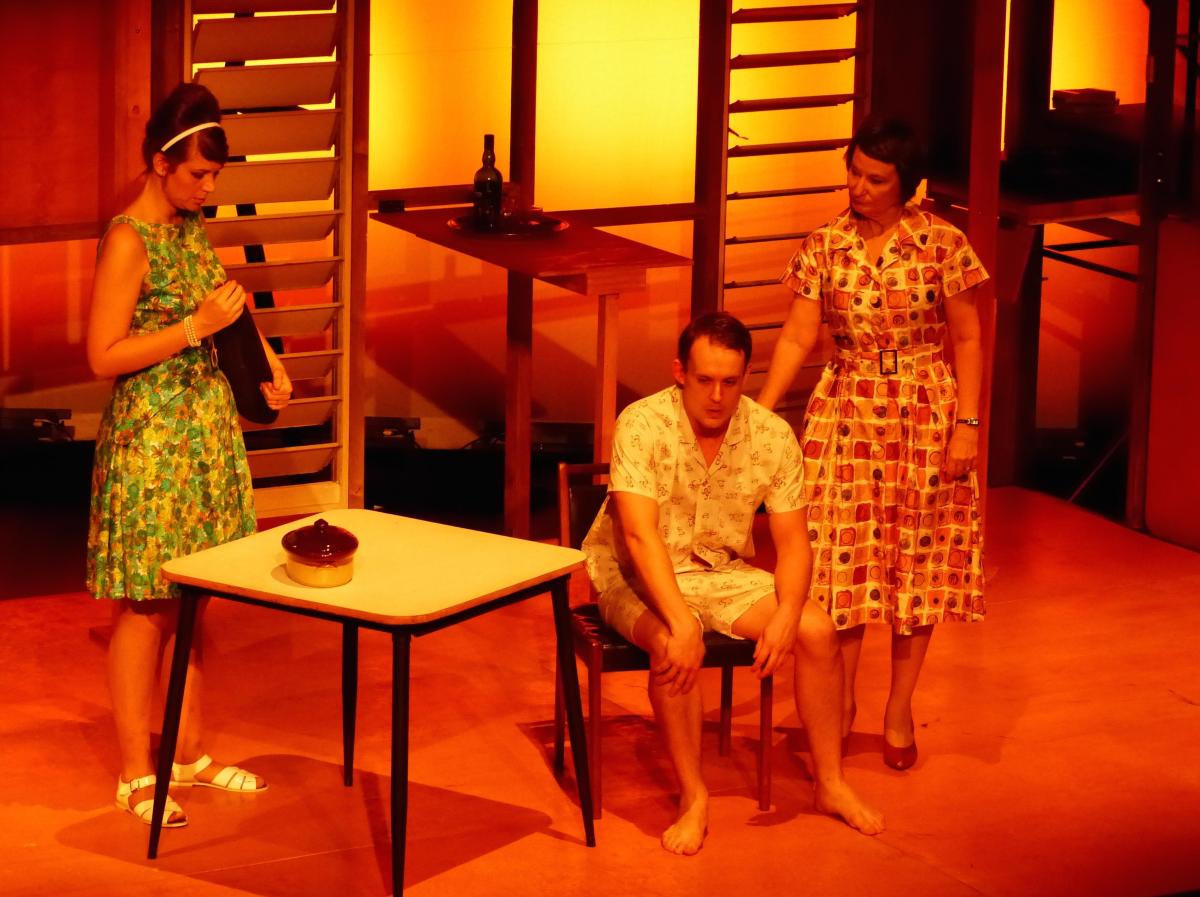Fresh from a sell-out season in Darwin comes this blockbuster of a play, a family saga of dark secrets and light comedy. The key question that Russell, the lead character asks is, ‘Who is my father?’ though the ‘bastard’ of the title refers just as much to the Northern Territory and, by extension, to Papua-New Guinea, a territory of Australia until 1975, and one that is still treated like one by some of our Canberra decision-makers. Russell is, as he claims, a ‘mulatto’ with two white parents. Well may he ask the question!
Stephen Carleton’s plays are focussed on northern Australia and its relationship to the rest of the country. For instance, Constance Drinkwater and the Last Days of Somerset, is set at the tip of Cape York in late-Victorian times when the colonies were about to embark on a new identity as the federated nation of Australia. This new play takes us on a journey through the last third of the twentieth century and into the twenty-first, when a rapidly changing Australia needs to find a new identity, one that suits its Asia-Pacific location and a rapidly growing multi-cultural population. The play is about —identity. Of the person, of the family, of the nation.
I love settings in Moresby and Darwin over the three periods, 1967, 1975 and 2001. Pre-Tracy Darwin in the 60s was exotic, as were Cairns and Moresby. 1975 saw an independent PNG arrive (too early for many expelled expats), and 2001? That was when the world turned over and realised the past had gone thataway. So too for the old Australia.
Carleton’s clever device is to set these turbulent times within a family context, with Russell at the centre of each episode. In 1967, Russell’s father, Neville, is a kiap in the Australian colonial administration. He meets Lois, a TAA hostie, in a bar in Moresby and they marry. The honeymoon is not long over when Neville returns, a changed man, from a devastating up-country excursion. Lois falls out of love, quickly becomes bored with the company of expats, and heads off into a world of transient pleasure leaving her husband to look after the boy. That’s enough plot to get going. The story unfolds over three acts, never losing momentum.
That said, perhaps there is too much momentum in this production. It is as if the director, Ian Lawson, knowing the play to be lengthy, has instructed the cast to tear through it at the rate of knots. To be fair, there is a lot of ground to cover. It also has a large cast with most of the actors doubling up more than once, and some serious set-changes. But that aside, the words of a play remain paramount and an audience needs time to let them sink in.
In addition to the galloping dialogue, certain members of the cast sometimes treat their characters as caricatures (which may or may not have been the playwright’s intention). It does bring a few easy laughs but it also detracts from the seriousness of the central themes. It’s a matter of levels, and sometimes they top the scale unnecessarily.
As for the rest, the production is enjoyable and thought-provoking. You’ll go home and think about it for weeks. Benhur Helwend has a fine sense of timing and an ability to engage the audience on a number of levels in his varied roles. His performances are a tour de force, but as Russell in particular he needs to slow down a notch or three. Kathryn Marquet, as Lois, with at least three ‘gentleman’ callers (shades of Tennessee Williams) undergoes a series of transformations from ingénue to salope to recluse as the play progresses, managing each personality change very effectively. Peter Norton, as the Young Neville, who later becomes Alistair, Russell’s gay partner, strikes me as a dedicated young actor with a lot of potential. Ella Watson-Russell is a particularly versatile actor, as Cairns audiences know, and in the three roles she takes on in this play, she performs best as Cleo, the bohemian hippie of the first act and pushy reporter later. She also does a fair job of playing a young child but misses the mark by being unintelligible as the haughty Dutch expat, Tinneka van der Haar, which probably doesn’t matter much.
The highlight performances of the play come from the two seasoned performers, Stephen Tandy, as the elder Neville, and Suellen Maunder as the busybody expat and then narky schoolmarm, Nanette. Stephen Tandy’s commanding figure was never going to allow him to go unnoticed, but he towers over the third act with a gruff no-nonsense humanity, just as Suellen towers over the first and second with her depiction of the ever-superior colonial memsahib so reminiscent of the ‘Turtons and Burtons’ in E.M. Forster’s Passage to India.
Kris Bird’s set design had to be carried across the Australian continent and into Port Moresby as well. It takes the same basic form throughout – a typical North Australian Housing Commission house on stilts, with two levels. It is in turn a Moresby expat’s house, a cyclone-devastated wreck with no top floor and, after rebuilding, a café downstairs with an art gallery upstairs. It is backed by a cyclorama that allows for colourful backdrops appropriate to the tropics, and other effects engineered by lighting designer, Sean Pardy.
I defy anyone who hears the sound track not to be transported back to the times of Nana Mouskouri, ABBA, Suzi Quatro and Shirley Bassey. Guy Webster creates a nostalgic kaleidoscope of sound bites covering the past four decades —the sound track to the change in the national psyche that has occurred in that time.
By the end of the play, Russell has come to accept his identity. He finally accepts who he is, just as in some ways, by the twenty-first century, the Bastard Territory (at least the NT) has come to accept its unique identity as well – different, maybe more honest, certainly more multi-cultural, and more attuned to our Asian frontier. When it does finally become the seventh state of Capricornia, the way to acceptance will have been paved by writers like Carleton and Xavier Herbert.
Rating: 4 out of 5 stars
Bastard Territory
Written by Stephen Carleton
Director: Ian Lawson
Set Designer: Kris Bird
Light Designer: Sean Pardy
Sound Designer: Guy Webster
Stage Manager: Alexandra Miles
Production Manager: Mathew McHugh
Senior Technician: Sam Gibb
Cast: Ella Watson-Russell, Suellen Maunder, Benhur Helwend, Kathryn Marquet, Steven Tandy, Peter Norton
Jute Theatre Company, Abbott St, Cairns
www.jute.com.au
6-21 June





